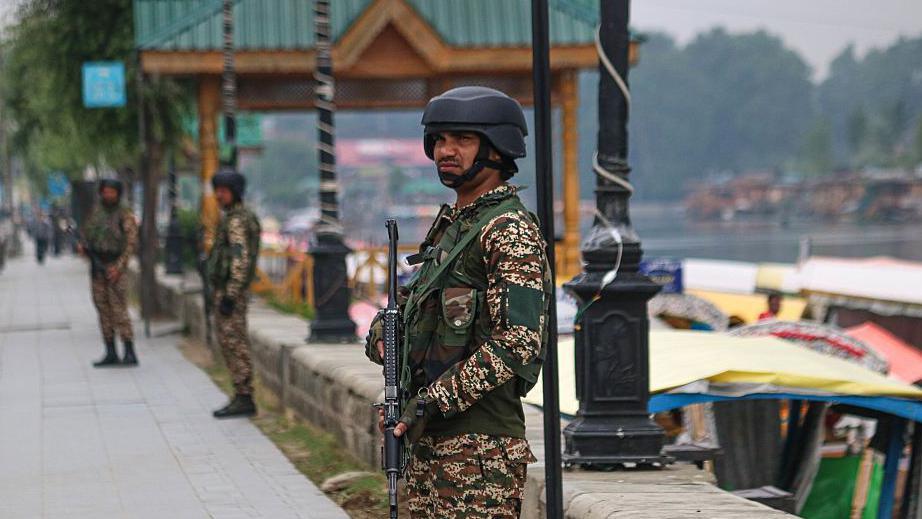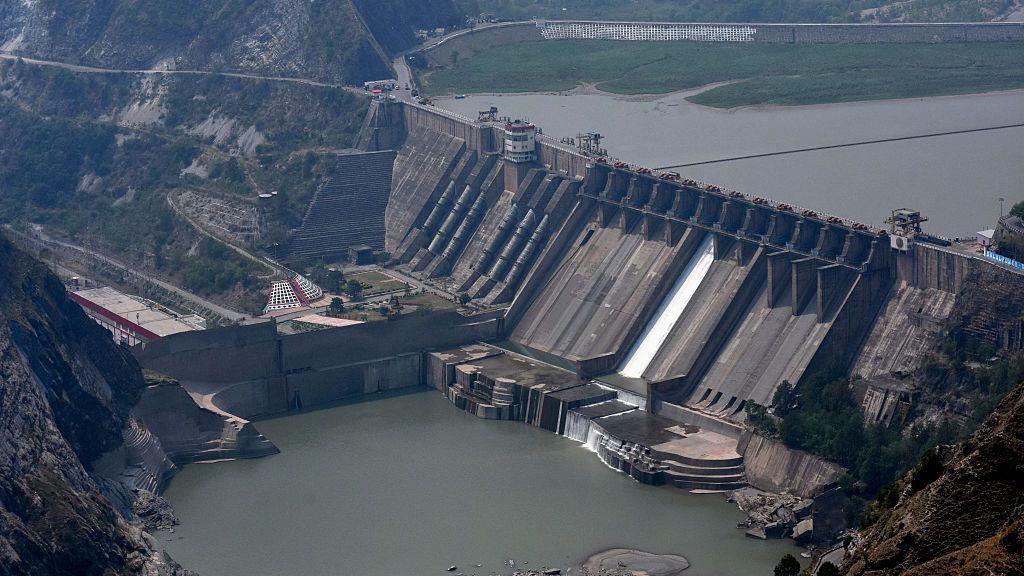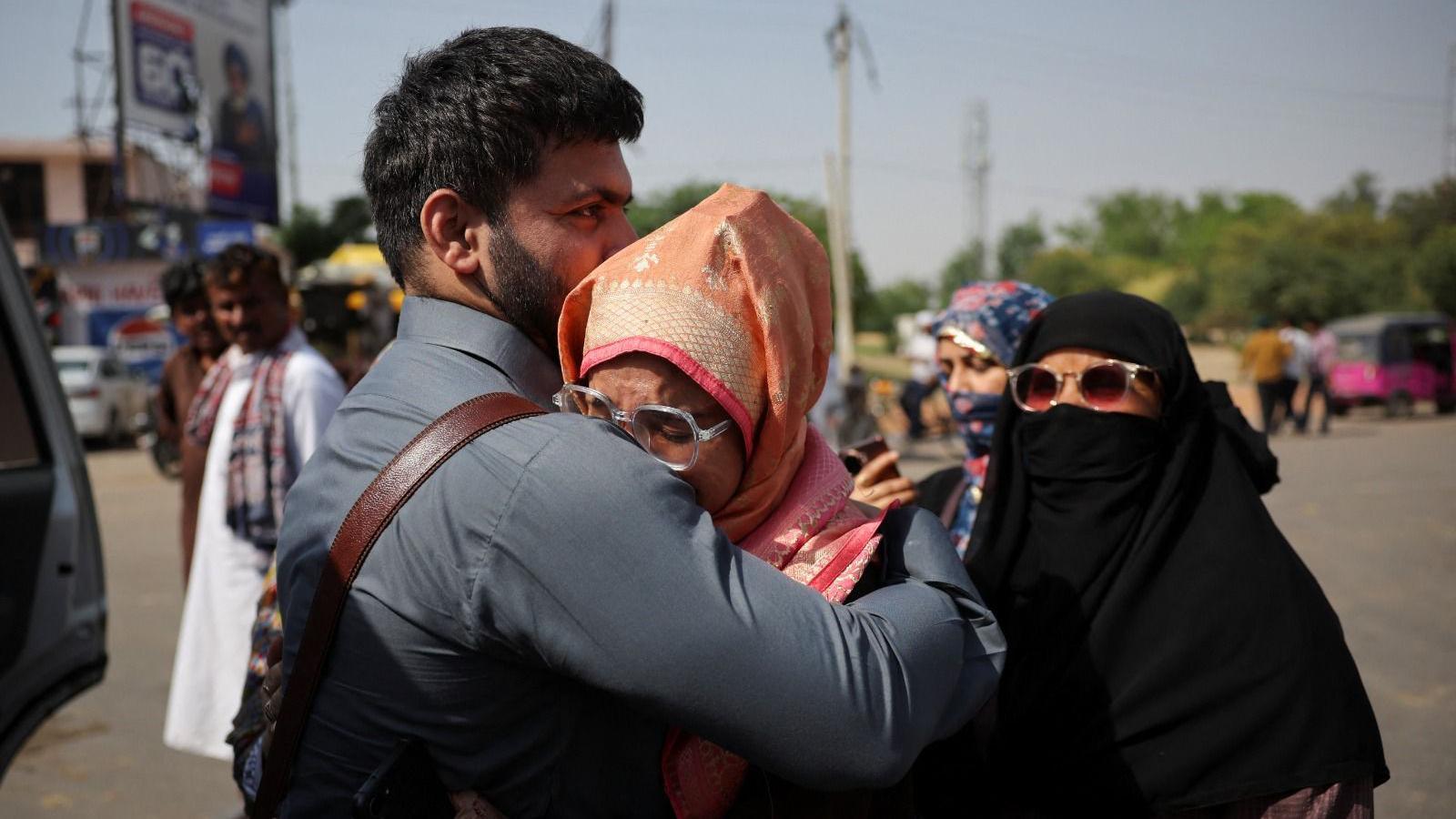These five measures remain, despite the India-Pakistan ceasefire

India and Pakistan agreed to a ceasefire on Saturday
- Published
Days after India and Pakistan agreed to a ceasefire, questions remain over what lies ahead for the two South Asian neighbours.
Early on 7 May, India launched air strikes into Pakistan and Pakistan-administered Kashmir in response to a deadly militant attack on tourists in India-administered Kashmir (Islamabad has denied involvement in the attack).
What followed were four days of intense shelling and aerial incursions between the two nuclear-armed countries, until the surprise ceasefire, external announcement on Saturday.
But - even accounting for the usually tense relationship between India and Pakistan - things are nowhere close to normal yet.
The fragile ceasefire, now in its fourth day, is still holding as life slowly begins to return to normal in towns along the de facto border between India and Pakistan.
Meanwhile, days before launching the military operation, India had announced a flurry of diplomatic measures against Pakistan, including suspending a key water-sharing treaty, halting most visas and stopping all trade.
In response, Islamabad announced its own set of tit-for-tat actions, including the suspension of visas for Indians, a trade ban and the closure of its airspace to Indian flights.
None of these punitive measures have been reversed by both countries so far. Here's where things currently stand between the two neighbours in terms of the measures announced since the Pahalgam attack:

India suspended the Indus Waters Treaty after the Pahalgam attack
Suspension of Indus Waters Treaty
On Monday, in his first public comments on the strike, India Prime Minister Narendra Modi said, "India's stand is absolutely clear - terror and talks cannot go hand in hand."
"Water and blood cannot flow together," he added.
His comments align with media reports citing sources that say that the key water-sharing treaty between India and Pakistan, known as the Indus Waters Treaty (IWT), remains suspended.
The 1960 treaty, brokered by the World Bank, governs water sharing of six rivers in the Indus basin between the two countries.
The IWT has survived two wars between the countries and was held up as an example of trans-boundary water management, until the suspension late last month.
Pakistan's Prime Minister Shehbaz Sharif had earlier said that he believed the water issue with India would be resolved through peaceful negotiations.
India's decision to suspend the treaty marks a significant diplomatic shift. Pakistan depends heavily on these rivers for agriculture and civilian water supply.
"Water cannot be weaponised," Pakistan's Finance Minister Muhammad Aurangzeb told Reuters news agency on Monday, adding that "unilateral withdrawal has no legal basis".
But experts say it's nearly impossible for India to hold back tens of billions of cubic metres of water from the western rivers during high-flow periods. It lacks both the massive storage infrastructure and the extensive canals needed to divert such volumes. However, if India begins controlling the flow with its existing and potential infrastructure, Pakistan could feel the impact during the dry season.
Soon after India suspended the IWT, Pakistan threatened to suspend a 1972 peace treaty called the Simla Agreement, which established the Line of Control, or de facto border between the countries. It hasn't suspended this so far.
Suspension of visas and expulsion of diplomats
India scaled down its diplomatic relations with Pakistan as part of its retaliatory measures.
It expelled all Pakistani defence attachés, external, declaring them "persona non grata" (unwelcome) and announced it would withdraw its own defence advisers from its high commission in Islamabad.
Pakistan responded with similar steps. Both countries reduced the staff at their respective high commissions.
Both India and Pakistan also suspended almost all visas given to people from the other country.
Closing of borders
As part of their retaliatory measures, both India and Pakistan shut down the Attari-Wagah border, the only land crossing between the two countries.
The border, which is heavily guarded and requires special permits to cross, has long been used by people visiting family members, attending weddings or reconnecting with loved ones across the border.
Both countries initially gave their citizens nearly a week to return, but the deadline was later extended.
For days, emotional scenes unfolded at the border, as families were separated, with some people staying behind.
After the 7 May strikes, India also announced that it would be closing entry from its side to the Kartarpur Sahib Corridor, which allows Indian pilgrims to visit one of Sikhism's holiest shrines in Pakistan without a visa.
Almost 200,000 Indians visited the Kartarpur shrine between 2021 and 2023, external, Indian officials said last year. The latest figures have not yet been released.
Indian Foreign Secretary Vikram Misri told reporters last week that the suspension would remain in place until further notice.

People bid their loved ones farewell after India and Pakistan suspended visas and closed borders
Closing air space
As part of its retaliatory measures, Pakistan also announced the closure of its airspace to all Indian flights.
In the following days, India responded with similar restrictions, closing its airspace to all Pakistani flights, both military and commercial.
International flights are now being forced to take longer, costlier detours, increasing both travel time and fuel expenses.
Suspension of trade
The two countries have also suspended all direct and indirect trade.
Experts say the impact on India would be minimal because it does not import much from Pakistan. However, it creates bigger problems for Pakistan.
Already struggling with high inflation and a weak economy, Pakistan could face more pressure as it loses access to trade routes and crucial goods from India, such as raw materials and medicines.
Follow BBC News India on Instagram, external, YouTube,, external Twitter, external and Facebook, external.